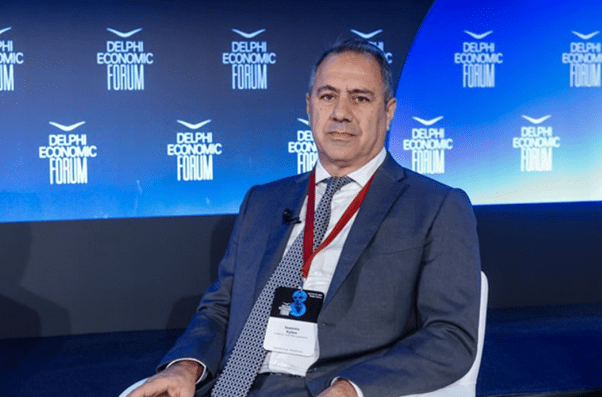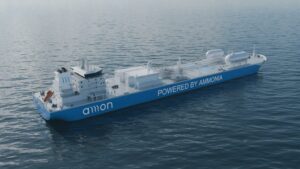
Photo credit: UGS / image: John Xylas, Shipowner, Treasurer of the UGS
In the context of the Delphi Economic Forum VIII, the Union of Greek Shipowners (UGS), through its President Ms. Melina Travlos at the opening ceremony and through other members of its Executive Committee and Board of Directors at the discussions about shipping, sent its messages from the emblematic area for Greece and the whole world, Delphi.
In particular, the UGS representatives talked about the various challenges the shipping sector faces at both European and global level, emphasizing the strategic importance of Greek shipping and the commitment of the shipping sector to its decarbonization.
The UGS representatives, inter, alia, stated that not more, but better regulation is needed and that there is no one size that fits all. EU’s environmental and political agenda should take into account the indispensable, strategic role of EU shipping, while it is vital that safety is paramount as the guiding principle in all environmental regulations. It was also underlined that Greek shipping is well-placed to respond and adapt to the ESG era, being a leader in investing in innovative, technological developments.
Ms. Melina Travlos, President of the Union of Greek Shipowners, institutionally representing Greek shipping as the leading sector of the national economy, stated at the Opening Session:
“Greek shipping is Europe’s superweapon. It is a national economic partner, providing billions of euros in maritime foreign exchange and hundreds of thousands of direct and indirect jobs, steadily investing in various sectors of our national economy. It is a national asset; it is our national pride. The national beneficence and social solidarity towards the motherland and the Greeks are consistent, silent, and broad. Our seamanship is our history. This new era has a new challenge, a new philosophy.”
From their side, Greek shipowners and representatives of the Greek Shipowners Union, gave their own perspective about the commitment of the shipping sector to its decarbonization.
Mr. A. Lemos, Vice President of the Union of Greek Shipowners, referred during the Fireside Chat, inter alia, to the following:
“EU Horizontal policy and regulations often fails to take into consideration the unique features of the shipping industry and the socio-economic impacts of said regulations. There are shortcomings in the revised EU ETS which includes shipping. It is vital to try to shape the new regulations so that they can achieve their goals, without overly burdening EU citizens who are ultimately the end-consumer.”
Mr. D. J. Fafalios, UGS Secretary, underlined at the session “Charting A Course To A Sustainable & Efficient Industry”, in which he participated that:
“The Greek shipping community is committed to shipping’s decarbonisation and has always supported global policies based on sustainable, viable and workable solutions adopted at the IMO. Global regulations are necessary to avoid distortion of competition. The shipping industry will fully embrace new technologies as they became mature but there must be also a balance between efficiency and decarbonization.”
Mr. J. Xylas, Treasurer of the UGS, during the “the Growing Pressure & Urgency For Change” session, said:
“The commitment and coordination of all relevant stakeholders is vital for shipping’s decarbonization. Collaboration is necessary among all in order to come up with feasible and fit-for purpose solutions. We need better regulation, not more regulation. Proliferation of private initiatives risks seriously damaging the efficiency of a vital internationally regulated regime.”
Mr. J. C. Lyras, UGS Board Member, stated during his participation at the “Overlook And Franco-Hellenic Perspectives On The Maritime Industries” session:
“The shipping industry, which is already by far the most energy efficient mode of transport, is fully committed to its decarbonization, notwithstanding that it is a fossil fuel captive and hard-to-abate sector. Its decarbonization, primarily requires the production in adequate quantities of alternative sustainable fuels and technologies which are, as yet, unavailable and the cooperation and commitment of a significant number of other stakeholders, like fuel producers and suppliers, shipyards and engine manufacturers.”


